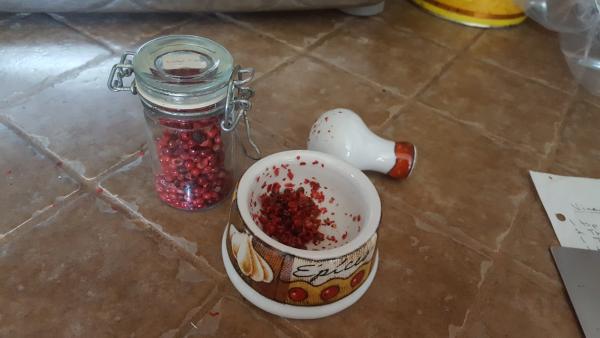So my recipe called for 1 tsp of red peppercorns.
and that was it - wha??? do I grind them? do I measure whole peppercorns? do I measure ground peppercorns? Is it 1 tsp whole? or 1 tsp ground?
The specific recipe was/is for a marinade. The marinade is actually quite mild very citrusy. I originally ground 1 tsp whole - then added another tsp whole.
Finally in the end I added a pinch of pepperoncini just like Lydia B would
But I often find it confusing if the recipe's are not clear... as in...
1 cup pasta
1 cup rice
etc etc
pasta are all different sizes - 1 cup orzo is certainly not 1 cup macaroni!
uncooked rice is certainly a different measure than cooked. Ok, I admit that most rice recipes do specify cooked or uncooked - but I think you all get the hint and have been there before.
So what are your solutions?

and that was it - wha??? do I grind them? do I measure whole peppercorns? do I measure ground peppercorns? Is it 1 tsp whole? or 1 tsp ground?
The specific recipe was/is for a marinade. The marinade is actually quite mild very citrusy. I originally ground 1 tsp whole - then added another tsp whole.
Finally in the end I added a pinch of pepperoncini just like Lydia B would
But I often find it confusing if the recipe's are not clear... as in...
1 cup pasta
1 cup rice
etc etc
pasta are all different sizes - 1 cup orzo is certainly not 1 cup macaroni!
uncooked rice is certainly a different measure than cooked. Ok, I admit that most rice recipes do specify cooked or uncooked - but I think you all get the hint and have been there before.
So what are your solutions?

